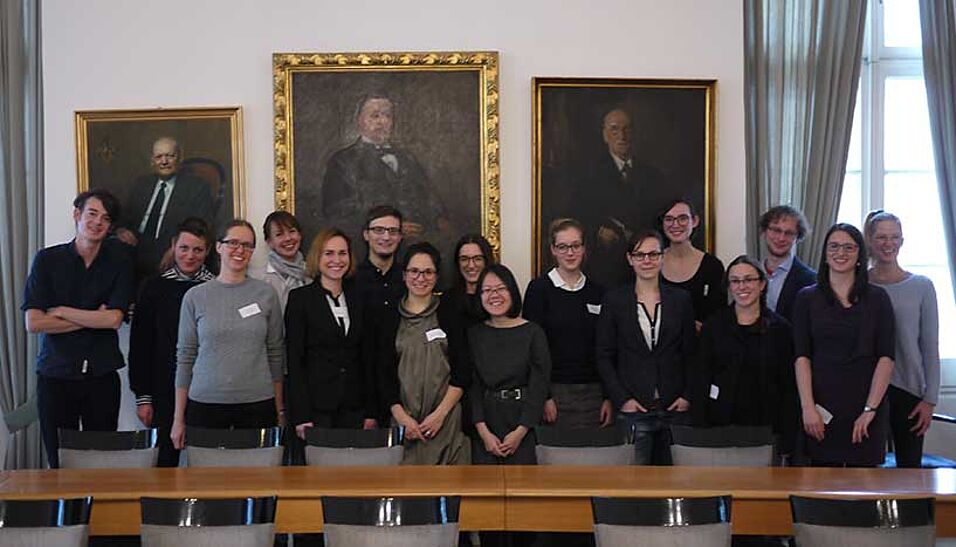- Warum haben Sie die sechste Graduiertenkonferenz der Vergleichenden Literaturwissenschaft organisiert?
Die Graduiertenkonferenz der Vergleichenden Literaturwissenschaft der Universität Wien hat bereits Tradition – sie fand heuer zum sechsten Mal statt und funktioniert nach einem bewährten Prinzip: Die aktuell am Institut der Universität Wien arbeitenden Jungwissenschaftler*innen organisieren eine Tagung für Doktorand*innen und Postdocs, die an komparatistischen Themen arbeiten und sich darüber austauschen möchten. Wir (Julia Grillmayr & Andrea Kreuter) haben in diesem Jahr Beiträge zum Thema „Raumirritationen – Wieso nach dem Raum fragen?“ gesammelt, da dieses eng mit unserer eigenen Forschung verbunden ist und ein Programm mit 16 Teilnehmer*innen erstellt. Den Abschluss der diesjährigen Graduiertenkonferenz bildete der erste komparatistische Science-Slam, im Zuge dessen komparatistische Forschungsprojekte auf kreative Weise in einem geselligen Rahmen präsentiert werden konnten.
- Was waren die größten Herausforderungen bei der Tagungsorganisation?
Eine große Frage stellte für uns natürlich die Finanzierung der Tagung dar. Da es sich um eine Graduiertenkonferenz gehandelt hat, waren konventionelle Tagungsgebühren hier keine Möglichkeit. Durch die finanzielle Unterstützung der Abteilung für Vergleichende Literaturwissenschaft der Universität Wien, dem DoktorandInnenzentrum der Universität Wien und der Studienvertretung Doktorat Philosophie war es uns dennoch möglich Plakate, Flyer und Programme für die Tagung zu drucken, Verpflegung für die Mittagspausen zur Verfügung zu stellen, zu einem Konferenzdinner einzuladen und einen kleinen Reisekostenzuschuss für die Teilnehmer*innen auszubezahlen. Eine sehr große Unterstützung erhielten wir zudem von der Österreichischen Akademie der Wissenschaften, die uns die Räume zur Verfügung stellte. Eine besondere Herausforderung stellte zudem die Organisation von gleich zwei Veranstaltungen, der Graduiertenkonferenz und dem Science-Slam, am letzten Abend dar, da hier bei Bewerbung, Finanzierung, etc. unterschiedliche Wege sinnvoll erschienen.
- Was wird Ihnen von der Tagung insbesondere in Erinnerung bleiben?
Die Konferenz empfanden wir deshalb als sehr gelungen, da sich in der sehr ausführlichen Diskussion viele Anknüpfungspunkte zwischen den Beiträgen ergaben. Zwar war das Programm mit 16 Vorträgen sehr dicht, aber dadurch, dass die Vortragszeiten – auch dank der erfahrenen Moderator*innen der Panels – sehr genau eingehalten wurden, blieb viel Zeit für freies Gespräch. Der Science Slam bot zudem einen sehr besonderen und von allen geschätzten Ausklang, wo nochmal die Möglichkeit bestand, sich in informellerem Rahmen zu vernetzen.
- Haben Sie Tipps für andere DoktorandInnen, die ebenfalls eine Nachwuchstagung planen?
Bei der Finanzierung war unsere Erfahrung, dass es sich vor allem lohnt hartnäckig zu bleiben; meist ist irgendwo doch noch ein wenig Geld verfügbar. Hier ist es sinnvoll breitgefächert zu denken und bei möglichst vielen Stellen nachzufragen. Da die letzten Tage vor der Konferenz erfahrungsgemäß sehr stressig sind, da noch viele unerwartete Dinge und Fragen zu klären sind, ist es gut sich schon frühzeitig um Kleinigkeiten wie Mappen, Blöcke, Namensschilder, etc. zu kümmern, so dass die Zeit am Ende nicht knapp wird.

